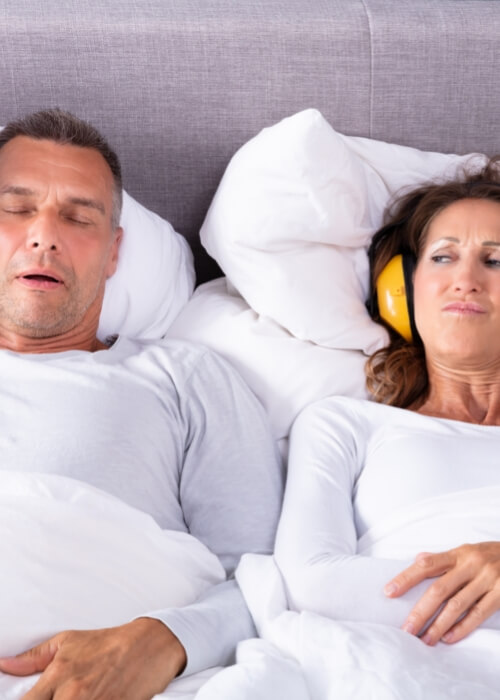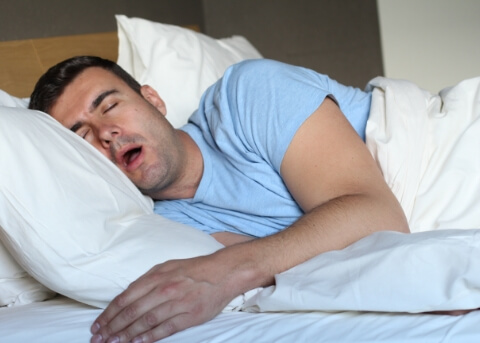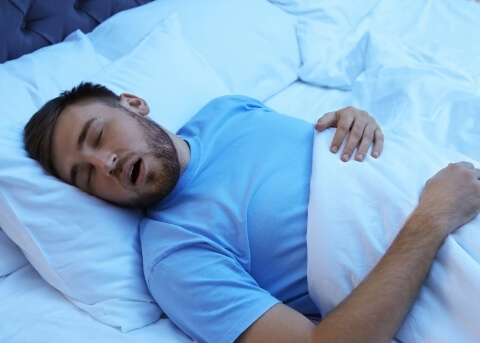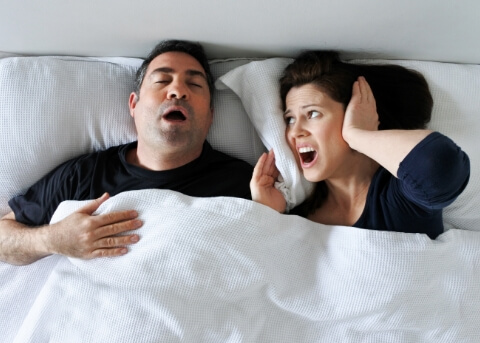Snoring & Sleep Apnea Cumming
Making Sleep More Peaceful for Everyone

If your loud snoring is keeping others awake, you might assume it’s time to purchase earplugs for those you love. However, snoring can be an indicator of a more troublesome problem – sleep apnea. While this is not always the case, it is worth contacting our team at Sleep Forsyth to schedule an appointment to learn more about snoring and sleep apnea in Cumming. We will help you take the steps to determine if your snoring is a symptom of sleep apnea.
Why Choose Sleep Forsyth for Help with Snoring?
- Customized Oral Appliances Available
- Uniquely Credentialed to Offer Medical Insurance Claims Filing
- Fewer Appointments for More Convenient Care
What’s the Problem with Snoring?

Most people assume that snoring is an annoyance and not an indicator of a more serious problem. While this is true in some cases, it’s not for all. Snoring occurs when tissues in the upper airway vibrate, causing the noise. These can include your throat, nose, and mouth. The vibration this creates leads to inflammation which can then lead to atherosclerosis, a thickening and hardening of the arteries. This is the main cause of all cardiovascular diseases such as heart attacks, strokes, and heart failure.
If you are the one snoring, you may not notice how it is affecting the person you’re sharing a bed with. Their inability to get adequate sleep can lead to frustration, fatigue, drowsy driving, and the inability to function at work.
This type of sleep deprivation can be dangerous and disheartening, making it difficult for the individual to think clearly or have enough energy to be productive throughout the day.
If I Snore, Do I Have Sleep Apnea?

The short answer is not necessarily. Snoring does not always mean that you have sleep apnea, but it can be a strong indicator. However, just because you may not have sleep apnea doesn’t mean you shouldn’t seek treatment. Refusing to see someone about your loud snoring can lead to the development of sleep apnea over time.
Who Is More Likely to Snore?

Snoring is not only a male problem or a female problem. While certain risk factors make an individual more prone to snoring, it should not be classified as an issue that only a certain type of person experiences.
Both men and women are known to snore, as are those who are overweight/obese to those that are physically fit. What it ultimately comes down to is how a person’s mouth, throat, and airway function. It’s important to remember that you’re not alone! Seeking treatment can help to reduce the possibility of heart attack, strokes, heart disease, and more.
Snoring FAQs
What Is the Connection Between Snoring and Sleep Apnea?
Snoring in Cumming is simply the sound that occurs as air brushes past tissues in your throat, causing them to vibrate. However, it often signals a partial blockage of your airway, which can disrupt airflow as you sleep. If this leads to outright pauses in breathing or periods of reduced breathing, you may have sleep apnea.
It is worth noting that occasional light snoring is probably no cause for concern. However, if your snoring is loud and frequent, there is a very real possibility that you have sleep apnea or are at risk of developing it.
Is It Possible That I Have Sleep Apnea Even if I Do Not Snore?
You might be surprised to learn that sleep apnea can occur even without noticeable snoring. Some individuals experience pauses in breathing or shallow breaths during sleep, yet make little or no sound. This is sometimes called “silent sleep apnea.”
Symptoms such as excessive daytime tiredness, morning headaches, and difficulty concentrating may indicate sleep apnea. You should not dismiss these signs solely because you do not snore, since sleep apnea affects people in different ways.
We recommend paying close attention to your overall sleep quality and any unexplained health changes. If you suspect sleep apnea, a sleep study may provide answers. After you get a diagnosis, we can start exploring your treatment options.
What Are Some Effective Home Remedies for Snoring?
You can try several strategies at home to reduce snoring. Maintaining a healthy weight, sleeping on your side rather than your back, and keeping nasal passages clear may help minimize airway obstruction. Avoiding alcohol and sedatives before bedtime also supports quieter sleep. Simple lifestyle adjustments like these often produce noticeable improvements in snoring frequency and intensity.
We provide oral appliances as a proven solution for persistent snoring. These custom-fit devices gently reposition your jaw or tongue to keep your airway open throughout the night. If home remedies do not provide relief, or if your snoring disrupts your sleep or daytime functioning, you should consider scheduling a consultation with our team. We will work with you to find the most effective approach to suit your needs.
What Are the Causes of Snoring?
You may experience snoring due to several factors. Obstructed airflow from relaxed throat muscles, a deviated septum, enlarged tonsils, or excess tissue in the airway can contribute to snoring. Allergies, nasal congestion, and anatomical differences also play a role. Lifestyle factors like weight, alcohol consumption, and sleep position further influence your risk.
Our practice understands that each case of snoring is unique. We can assess your individual risk factors to develop a tailored plan. Some causes of snoring respond well to oral appliances, which help reposition the jaw and tongue for improved airflow.
If I Sleep Alone, How Can I Tell if Snoring Is a Problem for Me?
You may find it challenging to detect snoring if you sleep alone. However, signs such as waking up tired, experiencing a dry mouth or sore throat in the morning, or feeling unusually fatigued during the day may point to disrupted sleep. Using smartphone apps or audio recorders can help track nighttime noises and identify signs of snoring.

